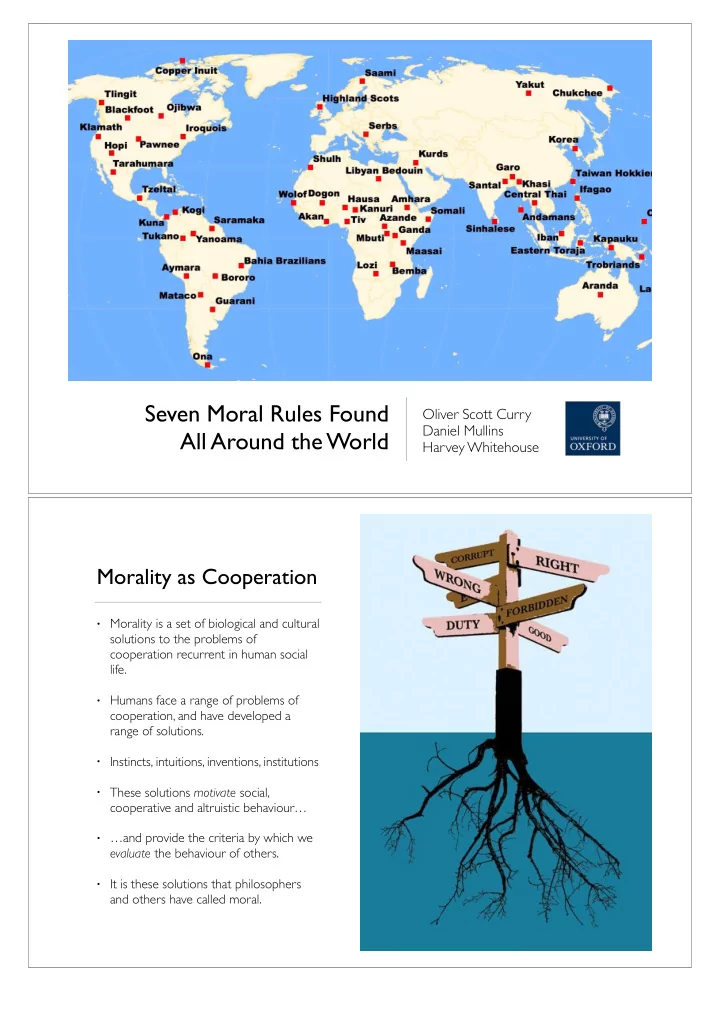

Seven Moral Rules Found Oliver Scott Curry Daniel Mullins All Around the World Harvey Whitehouse Morality as Cooperation • Morality is a set of biological and cultural solutions to the problems of cooperation recurrent in human social life. • Humans face a range of problems of cooperation, and have developed a range of solutions. • Instincts, intuitions, inventions, institutions • These solutions motivate social, cooperative and altruistic behaviour… • …and provide the criteria by which we evaluate the behaviour of others. • It is these solutions that philosophers and others have called moral.
Morality ≈ Cooperation • Justice is ‘what is for the benefit of the whole community’ or ‘to the common advantage’ (Aristotle) • Moral passions promote the ‘public interest’, the ‘public good’, a ‘common end’, ‘the general interests of society’, and ‘the good of mankind’ (Hume, 1739) • ‘Social cooperation is the foremost means by which the majority of us attain most of our ends. It is on the implicit if not the explicit recognition of this that our codes of morals, our rules of conduct, are ultimately based. ‘Justice’ itself…consists in observance of the rules or principles that do most, in the long run, to preserve and promote social cooperation’ (Hazlitt, 1964) • ‘The circumstances of justice may be described as the normal conditions under which human cooperation is both possible and necessary’ (Rawls, 1971) • ‘Protagoras, Hobbes, Hume and Warnock are all at least broadly in agreement about the problem that morality is needed to solve: limited resources and limited sympathies together generate both competition leading to conflict and an absence of what would be mutually beneficial cooperation’ (Mackie, 1977) Morality ≈ Cooperation • “Moral systems…suppress or regulate selfishness and make cooperative social life possible” (Haidt & Kesebir, 2010) • “morality functions to facilitate the generation and maintenance of long-term social-cooperative relationships” (Rai & Fiske, 2011) • “Human morality arose evolutionarily as a set of skills and motives for cooperating with others” (Tomasello & Vaish, 2013) • “the core function of morality is to promote and sustain cooperation” (Greene, 2015) • “moral facts are facts about cooperation, and the conditions and practices that support or undermine it” (Sterelny & Fraser 2016)
Animal Human MAC Theory Morals examples examples Kin recognition (Hepper, Kin altruism & incest Obligations to kin (Fukuyama, Kin selection (Hamilton, 1991). Parental care aversion (Lieberman, 2003, 1996); duty of parental care Kinship 1963, 1964). (Clutton-Brock, 1991; 2007), paternal investment (Edel, 1959); prohibition of Royle, 2012) (Geary, 2000). incest (Westermarck, 1906). Mutualism (Connor, 1995), Mutualism (Clutton-Brock, Coalition psychology (Kurzban, Friendship (Aristotle, coordination (Lewis, 1969; 2009); coordination 2001); theory of mind 1962); loyalty (Royce, Mutualism Schelling, 1960), coalitions (Boinski, 2000); coalitions (T omasello, 2005), in-group 1908); conformity (Tooby & Cosmides, 1996). (Harcourt, 1992). favouritism (Balliet, 2014). (Gibbard, 1990a, 1990b). Reciprocity (Henrich 2005; T rust (Baier , 1995); gratitude Reciprocal altruism Vampire bats? (Carter, Kocher 2008); , cheater detection (Emmons, 2004), guilt (Gibbard, Exchange (Axelrod, 1984; Trivers, 2013). (Cosmides, 2005), revenge & 1990), apology (Ohtsubo, 2009), 1971) forgiveness (McCullough, 2013). forgiveness (Downie, 1965). Formidability (Sell, 2010); Fortitude, bravery, skill, Hawk costly signalling (Hawkes, generosity, beauty (Hume, Animal conflict and costly Animal contests (Riechert, 1991, 2001; Miller, 2000); 1739; MacIntyre, 1981b) signals (Gintis, 2001; 1998; Hardy, 2013); noblesse oblige (Fiddick, Maynard Smith, 1973); dominance hierarchies 2013); dominance and Humility, respect, dominance and deference (Preuschoft, 2000). deference (Mazur, 2005); deference, obedience (Mazur, 2005). Dove status seeking (Anderson, (Feinberg, 1973; Hume, 2015) 1757). Ultimatum games (Güth, Fairness (Rawls, 1958); Bargaining and fairness 1982; Henrich, 2005); negotiation and Division (Maynard Smith, 1982; Primates? (Proctor, 2013) equality (Messick, 1993). ‘Cut compromise (Pennock, Nash, 1950; Skyrms, 1996) the cake’ (Brams, 1996) 1979). Endowment effect’ (Gintis, Property rights (Becker, Prior ownership (Gintis, Ownership & Territoriality 2007; Kahneman, 1979); 1977; Hume, 1739; Possession 2007; Maynard Smith, (Strassmann, 2002) territoriality (Johnson, 2014). Pennock, 1980). Theft 1982). Property law (Rose, 1985). (Westermarck, 1906). Seven types of cooperation and morality •special obligation to kin Kinship •duty of care to children Blood is thicker than water •incest aversion •loyalty Mutualism United we stand, divided we fall •unity, solidarity •conformity •reciprocity Exchange •gratitude, guilt One good turn deserves another •forgiveness •bravery With great power comes great Hawk •generosity responsibility •noblesse oblige •respect Dove •deference & obedience Blessed are the meek •humility •fairness Division Let’s meet in the middle •equity •compromise •property rights Possession •territory Possession is nine-tenths of the law •prohibition of theft
Kinship In Confucianism: “Duty to the family trumped all other duties” (Fukuyama, 1996). Loyalty: commitment to a common cause, (the “devotion of a patriot to his country”, Mutualism “the heart of all the virtues, the central duty amongst all duties” (Royce, 1908). The golden rule of 'do as you would be done by' present in all major world religions Exchange (Chilton & Neusner, 2009). "Courage, intrepidity, ambition, love of glory, magnanimity, and all the other shining Hawk virtues” (Hume, 1739). “a just sense of our weakness,” then “is esteem’d virtuous, and procures the good- Dove will of everyone” (Hume, 1739). Division “justice as fairness” (Rawls, 1958) Property rights acquired through "first possession" or "occupation", served to "to cut Possession off all occasions of discord and contention" (Hume, 1739). Bedouin, Korean, and Aymara
Moral Universalism •Hume: “Moral judgements depend on an “internal sense or feeling, which nature has made universal in the whole species” •“Truth, justice, courage, temperance, constancy, dignity of mind…friendship, sympathy, mutual attachment, and fidelity” are “the most universal, established principles of morals”, “esteemed universally, since the foundation of the world”, “in all nations and all ages”. Moral Relativism •Locke: “there is scarce that principle of morality to be named…which is not, somewhere or other, slighted and condemned by…whole societies of men.” •American Anthropological Association: “Ideas of right and wrong, good and evil…differ in their expression among different peoples. What is held to be a human right in one society may be regarded as anti-social by another people.”
Recommend
More recommend